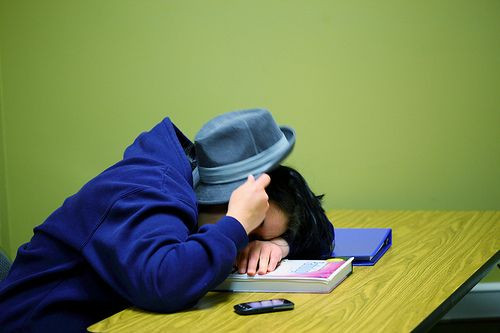Late Bedtimes For Teens Linked To Poor Academic Performance, Emotional Problems

The old adage “early to bed, early to rise, makes a man healthy, wealthy, and wise” has endlessly been reiterated to get children to adopt healthy sleeping habits. Teens faced with academic pressures, busy after-school schedules, and their desire to connect with friends on the phone or online often find themselves more active at night than during the day, leading to late bedtimes and daytime sleepiness. Teen night owls are more likely to experience poor academic performance and emotional problems, according to a recent study.
The National Sleep Foundation (NSF) suggests teens need a little over nine hours of sleep each night to function best, although eight-and-a-half may be enough for some. Teens are more likely to have irregular sleeping patterns throughout the week because they tend to stay up late and sleep in on weekends. These poor sleeping patterns affect their biological clock — the internal system that regulates when a person sleeps and when they are awake — and hurt the quality of their sleep. Only 15 percent of teens report sleeping eight-and-a-half hours on school nights, according to the NSF. This impacts bodily functions and brain activity, which play a part in school work and behavior.
Researchers from the University of California, Berkeley, sought to examine the sleep and circadian patterns of adolescents, and how it affects their academic performance and well-being. The study consisted of data from the National Longitudinal Study of Adolescent Health, a cohort of 2,700 U.S. adolescents. Three waves of data were collected to investigate how these patterns affected the teens. The first wave was conducted from Sept. 1994 to Dec. 1995 (the onset of puberty), the second wave was conducted from April to Aug. 1996 (a year later), and the third was from 2001 to 2002 (when they were young adults).
For the first wave, the researchers found that a late bedtime during the school year was linked to worse educational outcomes and emotional distress six to eight years later. Late bedtimes in the second wave were associated with more emotional distress during testing for the third wave. Shorter sleep time, however, was not linked with longitudinal changes in emotional and academic performance. Thirty percent of all adolescents in the study reported bedtimes past 11:30 p.m. on school days and 1:30 a.m. in the summer vacations.
Those who went to bed late during the summer did not experience negative effects on their academic performance during young adulthood, but there was a correlation between late summer bedtimes and emotional problems.
"This very important study adds to the already clear evidence that youth who are night owls are at greater risk for adverse outcomes,” said lead author of the study Dr. Allison Harvey, PhD, professor, clinical psychologist, and director of the Golden Bear Sleep and Mood Research Clinic at UC Berkley, according to Examiner.com.
At the onset of puberty, a teen’s circadian rhythm typically shifts to a later sleep cycle. Researchers believe teens who have an evening circadian preference — or those who are found to be most active at night — are influenced by biological factors, parental monitoring, academic and social pressure, and use of electronic devices.
“These findings underscore the significance of evaluating and monitoring bedtime in adolescents and the importance of intervention strategies that target bedtimes in an effort to reduce associated functional impairments, and improve academic and emotional outcomes,” wrote the researchers.
In a similar study published in the journal Pediatrics, researchers from the University College of London found that children with irregular bedtimes are more likely to experience behavioral difficulties such as hyperactivity, and have problems with friends and emotions. These unhealthy sleeping patterns can disrupt a child’s circadian rhythm and cause sleep deprivation which challenges brain development and the ability to control certain behaviors. Children who adopt regular bedtimes are more likely to show better control over their behavior than their night owl counterparts.
While late bedtimes seem more common among youth nowadays, both teams of researchers believe the effects of sleep deprivation are reversible.
“The good news is that sleep behavior is highly modifiable with the right support,” Lauren Asarnow, lead author of the study and a graduate student at UC Berkeley’s Golden Bear Sleep and Mood Research Clinic, said in a statement.
To learn how to encourage healthy bedtimes for your teens, click here.
Source: Asarnow L, Harvey A, McGlinchey E. The Effects of Bedtime and Sleep Duration on Academic and Emotional Outcomes in a Nationally Representative Sample of Adolescents. Adolescent Health. 2013



























